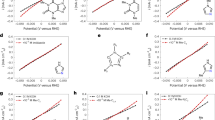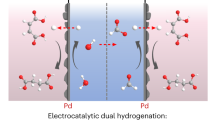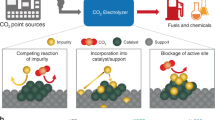Abstract
THE formation of hydrogen peroxide is considered by some authors1–3 as the possible source of the poor efficiency of oxygen electrodes in a fuel cell. Indeed, the reduction :  would proceed at a normal potential below 1.23 V if the foregoing reaction occurs in two steps:
would proceed at a normal potential below 1.23 V if the foregoing reaction occurs in two steps:  assuming that the second step is irreversible.
assuming that the second step is irreversible.
This is a preview of subscription content, access via your institution
Access options
Subscribe to this journal
Receive 51 print issues and online access
$199.00 per year
only $3.90 per issue
Buy this article
- Purchase on Springer Link
- Instant access to full article PDF
Prices may be subject to local taxes which are calculated during checkout
Similar content being viewed by others
References
Glasstone, S., and Hickling, A., Chem. Rev., 25, 407 (1939).
Bockris, J. O'M., and Huq, A. K. M. S., Proc. Roy. Soc., A, 237, 277 (1956).
Hoar, J. P., J. Electrochem. Soc., 109, 858 (1962).
Juliard, A. L., and Shalit, H., J. Electrochem. Soc., 110, 1002 (1963).
Will, F. G., and Knorr, C. A., Z. Elektrochem., 64, 258 (1960).
Breiter, N. W., Electrochem. Acta, 9, 441 (1964).
Author information
Authors and Affiliations
Rights and permissions
About this article
Cite this article
LIANG, C., JULIARD, A. Reduction of Oxygen at the Platinum Electrode. Nature 207, 629–630 (1965). https://doi.org/10.1038/207629a0
Published:
Issue Date:
DOI: https://doi.org/10.1038/207629a0
This article is cited by
-
Nanostructured electrocatalysts with tunable activity and selectivity
Nature Reviews Materials (2016)
Comments
By submitting a comment you agree to abide by our Terms and Community Guidelines. If you find something abusive or that does not comply with our terms or guidelines please flag it as inappropriate.



